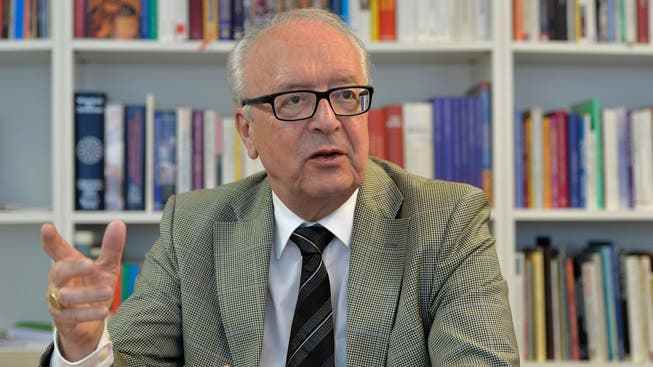The university pastor and former radio preacher Frank Jehle was a theologian who always found access to people. He died in St. Gallen on October 23.
Diverse and open work: the theologian Frank Jehle (September 9, 1939 to October 23, 2022).
I met Frank Jehle for the first time at the HSG. At that time he was a university chaplain and I was a student. Two things emerged from this first meeting. First, he told me: One should hold a point of view, but keep an open mind. Secondly, he gave me the book he had written together with his wife Marianne: A Little St. Gallen Reformation History.
At the time, I didn’t know how much this encounter would shape my life. I realized even less how much she revealed to me about Frank Jehle as a person. He was a person with definite points of view. And with an equally dedicated cosmopolitanism. He was a theologian who had something to say. And who brought theology into dialogue with the world.
Even a cursory look at his list of publications shows how diverse and open his work was. The book titles speak for themselves, for example “The Little Book of Legends” (1983), “What Do We Really Believe?” (1989), «How many times do we live?» (1996), “Christmas with Caravaggio” (2013) or “Annunciation is not a monologue” (2021).
In three major biographies, Jehle found the balance between theological stringency, methodical strength and empathy. The first was “It’s better to be uncomfortably loud than pleasantly quiet”. There he made the theologian Karl Barth humanly comprehensible by presenting his political activities and thoughts. Jehle succeeded in “grounding” the abstract theologian Barth as a practically thinking activist. The book became a success; his new editions and his translations into French and English bear witness to this.
In many respects, however, “Emil Brunner, Theologian in the 20th Century” is Jehle’s masterpiece. Access to Brunner’s private archive allowed him to be portrayed as a complex thinker and a multi-faceted person. Jehle meticulously worked through the materials and made them systematically accessible to the general public for the first time. With over 600 pages and almost innumerable references, this document became the basic book on Brunner.
The third biography dealt with his wife’s father, the theologian Hans Wildberger. In a similarly sensitive way, Jehle worked out the life and theology of the Brunner student and Jeremiah expert.
Frank Jehle was a practical theologian. The books were just a way for him to enter into an exchange with people. His involvement in the church was different. He served as a member of the synod and as synod president in St. Gallen. He was also a member of the auditing authority for the Evangelical-Reformed Churches in German-speaking Switzerland and co-president of the Swiss Evangelical/Roman Catholic Discussion Commission.
He also sought direct and trusting access to other people as a pastor, university chaplain and radio preacher. Between 2001 and 2007 you could listen to him on DRS 2. He always found access. Not only were we many students who kept going to see him in the “Steinbock” – the name of the university pastoral care. It was not uncommon for my relatives to be so touched by his radio sermons that they wept for joy – and they weren’t even Reformed.
Jehle continued to preach well after his retirement. His farewell in St. Gallen-St. He held Mangen in November 2021. In recent years he has repeatedly built the bridge from music and art to theology. Ultimately, he wanted to reach the whole person. That is also the core of his theology: the hope that people are called to learn from one another with reason and feeling.
That’s why Frank Jehle didn’t shy away from showing rough edges. He understood the discourse as a learning process and was accordingly able to be tough in taking and giving. With a skillful hand, Marianne resolved many a disagreement between him and me in our long friendship. I wish I had had many more encounters with Frank Jehle.
